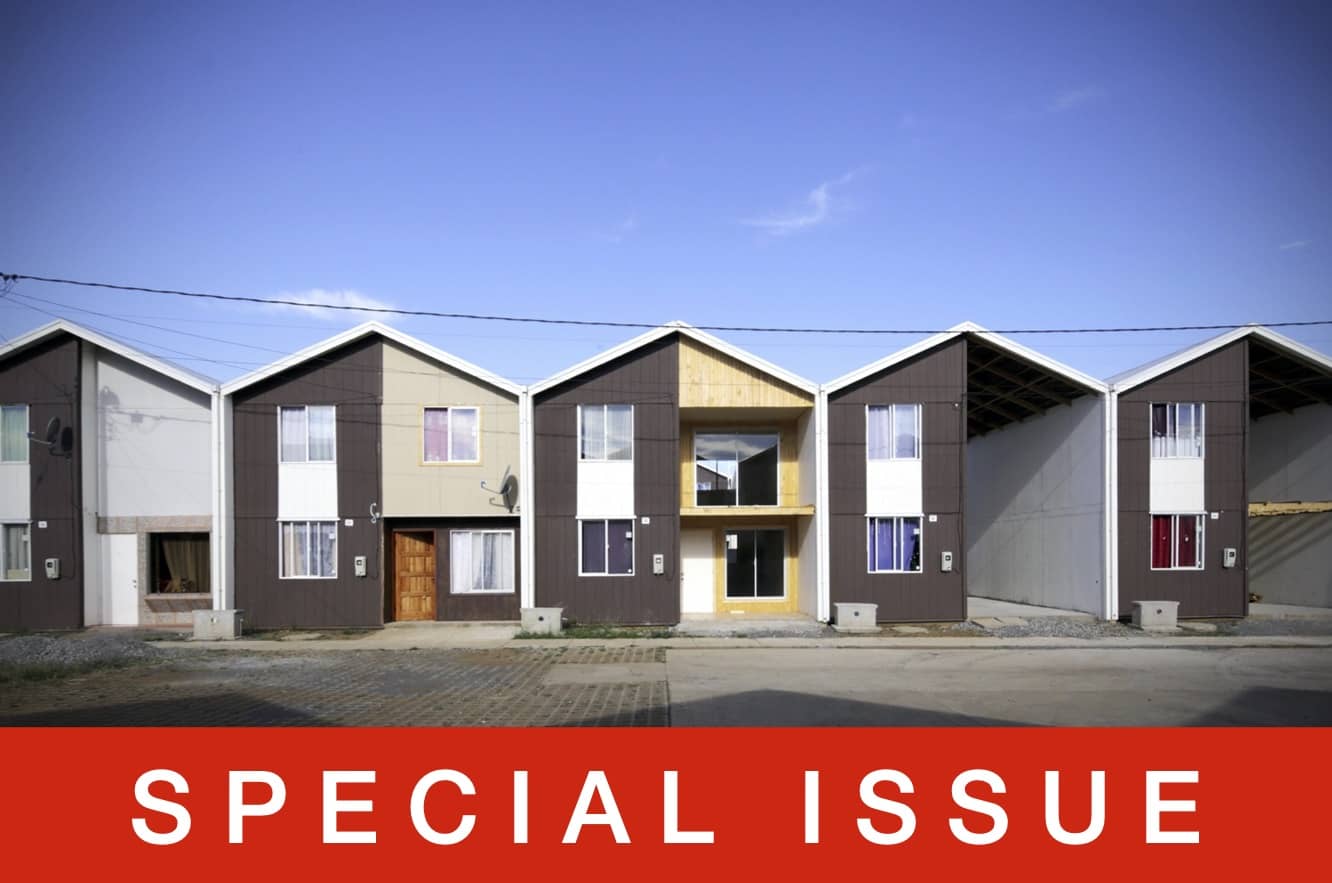
www.buildingsandcities.org/journal-content/special-issues/housing-adaptability2.html
Housing Adaptability

This special issue advances the understanding and implementation of housing adaptability and flexibility across a range of issues: spatial, social, environmental, economic, time and multi-use and multiuser adaptability.
The adaptability of our homes is a social, emotional and cultural issue as much as a technical or construction challenge. The need for housing adaptability and flexibility became apparent during the pandemic, when an increasing range of activities, such as working, studying, home-schooling, exercising etc., occurred in homes that were never designed for this purpose and thus ill-suited. However, the need for adaptability and flexibility is also necessary at other times during a building's lifespan. Dwellings need to accommodate new working practices promoted by digitisation, or a changing demographic (ageing population, migration, fluctuation of household members).
Guest editors: Sofie Pelsmakers and Elanor Warwick
This special issue explores how to best adapt spaces to accommodate different and changing user needs (on a daily, seasonal, long term basis) and user generations. The papers in this special issue explore:
- Concepts of adaptability and flexibility in housing and their implications
- The potential for existing and new housing to become more adaptable over time
- Drivers and barriers to implementing housing adaptability
- How residents may overcome unadaptable spaces
- The benefits and unintended consequences
- What shapes inhabitants' needs, perceptions and expectations for adaptable spaces
The papers in this special issue challenge policymakers, planners, clients, developers and designers to make new and existing dwellings more adaptable. This special issue makes clear both the needs and benefits that accrue from providing adaptability in housing. Moreover, it is financially viable to do so. When embarking on retrofitting strategies to mitigate greenhouse gas emissions from the housing stock, it would be wise and cost-effective to include adaption in retrofit programmes. But there is an equal justification for making the housing stock more widely adaptable - especially given the decreasing size of dwellings and changing nature of work and education. A home's adaptive capacity supports an individual's and community's resilience when faced with different life events and their associated disruptions and consequences.
Table of contents
Housing adaptability: new research, emerging practices & challenges (Editorial)
S. Pelsmakers & E. Warwick
Sharing a home under lockdown in London
F. Blanc & K. Scanlon
Adapting owner-occupied dwellings in the UK: lessons for the future
T. Hipwood
Architects' 'enforced togetherness': new design affordances of the home
E. Marco, M. Tahsiri, D. Sinnett & S. Oliveira
Inclusive Living: ageing, adaptations and future-proofing home
V. McCall
Balconies as adaptable spaces in apartment housing
T. Peters & S. Masoudinejad
The use of apartment balconies: context, design and social norm
M. Smektała & M. Baborska-Narożny
Residents' views on adaptable housing: a virtual reality-based study
J. Tarpio & S. Huuhka
Lack of adaptability in Brazilian social housing: impacts on residents
S.B. Villa, P.B. Vasconcellos, K.C.R. de Bortoli, & L.B. de Araujo
Commentaries
Housing Adaptability: Some Past Lessons
A. Rabeneck
Key Lessons for Adaptable Housing
F. Holliss
Launch Events - Videos
To promote a wider international dialogue, an international virtual event was hosted by a leading UK building industry think tank, The EDGE, on 27 February 2023 (chaired by John Palmer, UK Department for Levelling Up, Housing and Communities).
Speakers
Introduction to Adaptable Housing
Elanor Warwick (Clarion Housing Group)
The Value of Adaptability to Residents
Jyrki Tarpio (Tampere University)
Housing Adaptability: Design Strategies
Astrid Smitham (Apparata Architects)
Balcony Design: Do We Know What Inhabitants Need?
Marta Smektala (Wroclaw University of Science & Technology)
Respondents
Three key respondents from industry, government and academe briefly consider the whether and how adaptability in housing can be fostered:
Kirk Archibald (Director, Think Three)
Amy Burbidge (Head of the Master Development and Design Team, Homes England)
Philip Graham (University of Cambridge)
Latest Peer-Reviewed Journal Content
Acceptability of sufficiency consumption policies by Finnish households
E Nuorivaara & S Ahvenharju
Key factors for revitalising heritage buildings through adaptive reuse
É Savoie, J P Sapinski & A-M Laroche
Cooler streets for a cycleable city: assessing policy alignment
C Tang & J Bush
Understanding the embodied carbon credentials of modern methods of construction
R O'Hegarty, A McCarthy, J O'Hagan, T Thanapornpakornsin, S Raffoul & O Kinnane
The changing typology of urban apartment buildings in Aurinkolahti
S Meriläinen & A Tervo
Embodied climate impacts in urban development: a neighbourhood case study
S Sjökvist, N Francart, M Balouktsi & H Birgisdottir
Environmental effects of urban wind energy harvesting: a review
I Tsionas, M laguno-Munitxa & A Stephan
Office environment and employee differences by company health management certification
S Arata, M Sugiuchi, T Ikaga, Y Shiraishi, T Hayashi, S Ando & S Kawakubo
Spatiotemporal evaluation of embodied carbon in urban residential development
I Talvitie, A Amiri & S Junnila
Energy sufficiency in buildings and cities: current research, future directions [editorial]
M Sahakian, T Fawcett & S Darby
Sufficiency, consumption patterns and limits: a survey of French households
J Bouillet & C Grandclément
Health inequalities and indoor environments: research challenges and priorities [editorial]
M Ucci & A Mavrogianni
Operationalising energy sufficiency for low-carbon built environments in urbanising India
A B Lall & G Sethi
Promoting practices of sufficiency: reprogramming resource-intensive material arrangements
T H Christensen, L K Aagaard, A K Juvik, C Samson & K Gram-Hanssen
Culture change in the UK construction industry: an anthropological perspective
I Tellam
Are people willing to share living space? Household preferences in Finland
E Ruokamo, E Kylkilahti, M Lettenmeier & A Toppinen
Towards urban LCA: examining densification alternatives for a residential neighbourhood
M Moisio, E Salmio, T Kaasalainen, S Huuhka, A Räsänen, J Lahdensivu, M Leppänen & P Kuula
A population-level framework to estimate unequal exposure to indoor heat and air pollution
R Cole, C H Simpson, L Ferguson, P Symonds, J Taylor, C Heaviside, P Murage, H L Macintyre, S Hajat, A Mavrogianni & M Davies
Finnish glazed balconies: residents' experience, wellbeing and use
L Jegard, R Castaño-Rosa, S Kilpeläinen & S Pelsmakers
Modelling Nigerian residential dwellings: bottom-up approach and scenario analysis
C C Nwagwu, S Akin & E G Hertwich
Mapping municipal land policies: applications of flexible zoning for densification
V Götze, J-D Gerber & M Jehling
Energy sufficiency and recognition justice: a study of household consumption
A Guilbert
Linking housing, socio-demographic, environmental and mental health data at scale
P Symonds, C H Simpson, G Petrou, L Ferguson, A Mavrogianni & M Davies
Measuring health inequities due to housing characteristics
K Govertsen & M Kane
Provide or prevent? Exploring sufficiency imaginaries within Danish systems of provision
L K Aagaard & T H Christensen
Imagining sufficiency through collective changes as satisfiers
O Moynat & M Sahakian
US urban land-use reform: a strategy for energy sufficiency
Z M Subin, J Lombardi, R Muralidharan, J Korn, J Malik, T Pullen, M Wei & T Hong
Mapping supply chains for energy retrofit
F Wade & Y Han
Operationalising building-related energy sufficiency measures in SMEs
I Fouiteh, J D Cabrera Santelices, A Susini & M K Patel
Promoting neighbourhood sharing: infrastructures of convenience and community
A Huber, H Heinrichs & M Jaeger-Erben
New insights into thermal comfort sufficiency in dwellings
G van Moeseke, D de Grave, A Anciaux, J Sobczak & G Wallenborn
'Rightsize': a housing design game for spatial and energy sufficiency
P Graham, P Nourian, E Warwick & M Gath-Morad
Implementing housing policies for a sufficient lifestyle
M Bagheri, L Roth, L Siebke, C Rohde & H-J Linke
The jobs of climate adaptation
T Denham, L Rickards & O Ajulo
Structural barriers to sufficiency: the contribution of research on elites
M Koch, K Emilsson, J Lee & H Johansson
Disrupting the imaginaries of urban action to deliver just adaptation [editorial]
V Castán-Broto, M Olazabal & G Ziervogel
Nature for resilience reconfigured: global- to-local translation of frames in Africa
K Rochell, H Bulkeley & H Runhaar
How hegemonic discourses of sustainability influence urban climate action
V Castán Broto, L Westman & P Huang
Fabric first: is it still the right approach?
N Eyre, T Fawcett, M Topouzi, G Killip, T Oreszczyn, K Jenkinson & J Rosenow
Social value of the built environment [editorial]
F Samuel & K Watson
Understanding demolition [editorial]
S Huuhka
Data politics in the built environment [editorial]
A Karvonen & T Hargreaves



Latest Commentaries
Decolonising Cities: The Role of Street Naming
During colonialisation, street names were drawn from historical and societal contexts of the colonisers. Street nomenclature deployed by colonial administrators has a role in legitimising historical narratives and decentring local languages, cultures and heritage. Buyana Kareem examines street renaming as an important element of decolonisation.
Integrating Nature into Cities
Increasing vegetation and green and blue spaces in cities can support both climate change mitigation and adaptation goals, while also enhancing biodiversity and ecological health. Maibritt Pedersen Zari (Auckland University of Technology) explains why nature-based solutions (NbS) must be a vital part of urban planning and design.